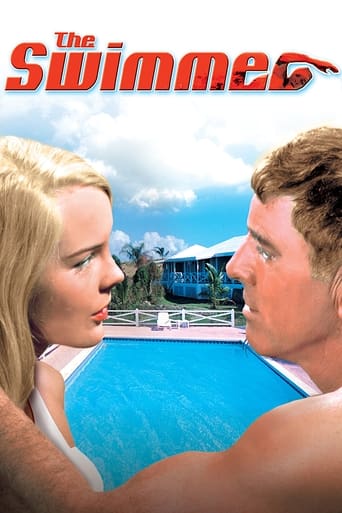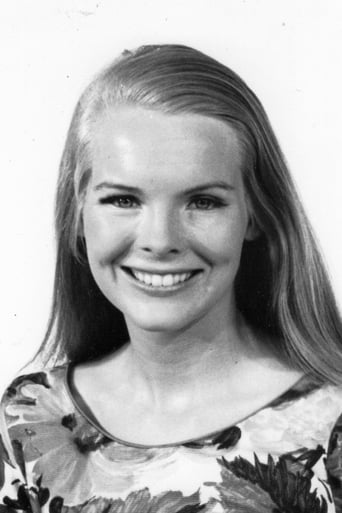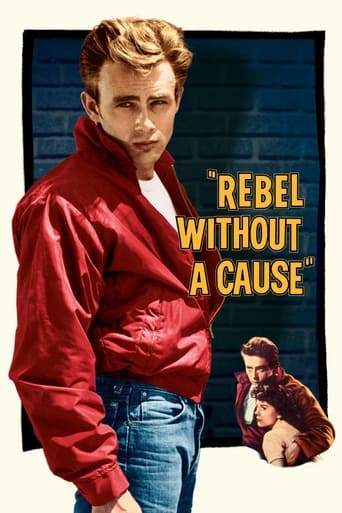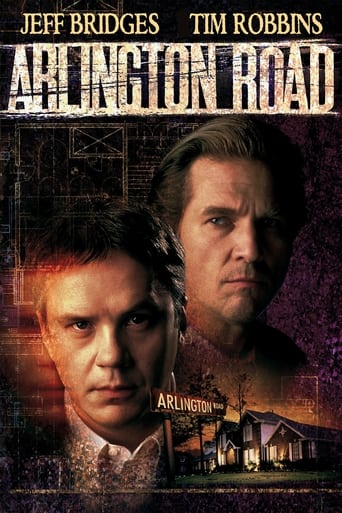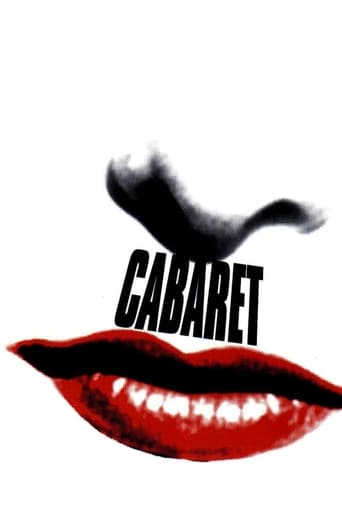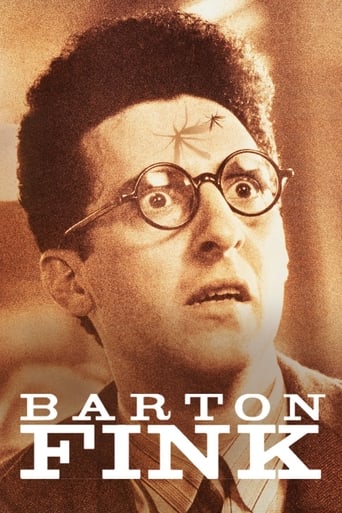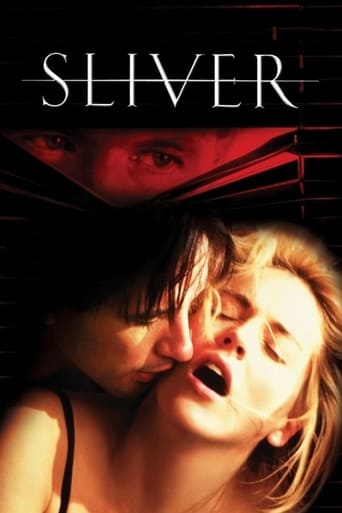The Swimmer (1968)
Well-off ad man Ned Merrill is visiting a friend when he notices the abundance of backyard pools that populate their upscale suburb. Ned suddenly decides that he'd like to travel the eight miles back to his own home by simply swimming across every pool in town. Soon, Ned's journey becomes harrowing; at each house, he is somehow confronted with a reminder of his romantic, domestic and economic failures.
Watch Trailer
Cast


Similar titles
Reviews
It's the kind of movie you'll want to see a second time with someone who hasn't seen it yet, to remember what it was like to watch it for the first time.
The movie turns out to be a little better than the average. Starting from a romantic formula often seen in the cinema, it ends in the most predictable (and somewhat bland) way.
It is an exhilarating, distressing, funny and profound film, with one of the more memorable film scores in years,
The movie really just wants to entertain people.
I had no idea they'd made a movie of The Swimmer. But I'll watch anything with Burt Lancaster in it. My goodness, Lancaster is mid-50s and he's in great shape. He took swimming lessons for this role but he looks like a complete natural. Although over-baked in some regards - the gushy music, the ending, the zooms, the montages - this still drew me in. Since nobody else has mentioned her I have to give props to Janice Rule's performance as Shirley. That was the most affecting scene to me. She was dynamite.
I liked that Burt Lancaster called The Swimmer, about a man who decides to "swim to home" across the relatively quiet upper-middle class suburbia by taking a swim in each of his neighbors swimming pools (and one rec center), "Death of a Salesman in swim trunks." I can still see the connections with the disillusionment of, and a critique by others, of the American (white) middle-class male in the promise of having it "all", but having the connection to Willy Loman and the story of falling so completely from grace and promise (and failing himself repeatedly) marks this as something special in American cinema at the time. And Burt Lancaster, in his 50's by the time he made this, is fit for the part (in more ways than one) and really gets into how this man is so happy to be doing this "adventure" as he calls it, like he's some sort of explorer. But what is he exploring? Actual places, or people's hearts and minds? A lot of this can be (or should be, or both) read as an allegory, or some kind of surrealistic dive (no pun intended) into the well-off. These people have such lavish homes and places, none of them have to worry about being without (though a little boy may be taught to value his money early on with a lemonade stand), and of course their pools and/or tennis courts. So with a story like this, adapted from a short piece of prose by John Cheever, the plot isn't really of significance. Although, to that point, it is fascinating for me in watching this how it feels like he *must* swim at each of the places he stops at, even if it's only for several seconds. And at one point when he discovers one pool that's been drained of water - the lemonade entrepreneur can't swim - he mock-swims it. Not great, but close enough.So with this extremely basic through-line we get what is more closely related to European cinema of the period: it's a mood piece, all about expressing how this man goes across the spectrum. He is jubilant, happy, accomplished, serious, focused-determined, downtrodden, sad, angry, kind of crazy, bewildered (watch out for those cars in that heavily edited walking-across-a-highway sequence!) and melancholy. The conflicts of the movie come from whether or not those he comes across will be good to him or not; it seems like, for the most part, everyone at least has some familiarity with him and at most they've even had relationships - in one woman's case, Shirley (a fantastic ten minutes for Janice Role), a former lover... on the side, as it were.If it has any closer relation than Death of a Salesman, which may have been what was most comparable at the time for Lancaster, it's Mad Men: I could have see Don in a sort of dream episode like this, where everything from masculinity to ethical codes to psychology and how men treat women and objects and possessions comes into question. And Lancaster is the one here going through these emotions, to plumb the depths to get at what this man may be all about, to excellent effect. There are moments it feels like he could become, well, affected in his delivery but it doesn't happen; he's a passionate person and comes off as such in whatever he's talking about (and it may even come close to being uneasy, like a walk and talk with a much younger woman, an ex "babysitter"). If Lancaster doesn't work than neither does the movie, in large part. I'm glad he gets to deliver here and it's certainly one of his three or four major pieces of acting in a career full of wonderful roles.If I don't quite love the movie as much as some out there - a flop on release initially it's gained a following over time (youtube Gilbert Gottfried and TCM, of all people, to see a good talk about the film) - it may be because certain little things make it awkwardly dated. When Ned is walking through the woods to go from place to place it's shot and edited to be fairly dream-like and hallucinatory, which may be fine thematically, but in how it looks today it's stuck in that 60's way of messing with lenses and filters and shots far off with actors speaking ADR that doesn't totally work for me. And there's a short scene at one of the houses where a young Joan Rivers pops up and it feels misdirected (and according to her she was).These small misgivings aside, it is a film that is lucky to get its audience over the years. It's at times strange and borderline, darkly, comical, and then by the last half hour as things get grimmer and more oppressive (and that last several minutes when he does get 'home'), it has the feeling of some fable that's gone into the realm of tragedy. We may not understand fully what Ned's gone home to, but there's some intuition that failure is at the heart of it. And maybe the river will flow for someone else some other time...
"The Swimmer" is a brilliant one-man show for aging Burt Lancaster - - an impressionistic swirl of suburban alienation that hits vaguely like a reverse-image of "The Graduate." Director Frank Perry (most in- famous for TV films like "Mommie Dearest") allows his actors total free reign in their characterizations and this results in an uneven film that feels like it's supposed to be uneven. Lancaster holds the whole enterprise together.... he had long before figured out how, with films like "Sweet Smell of Success", to make himself less appealing. But all his performances are grandiose, and here he's given us a vision of the grand pathetic.... a sort of suburban Lear.The film thematically is very interesting, as you don't really see a film very often about personal failure. His professional failure is something that we figure out about halfway through the film, but we don't want to face the idea that he is a failure as a human being any more than he does. Every gesture that seems spontaneous early in the film, every moment that comes across as an expression of his will to power and his joy in living, later reveals itself as dull repetition and escapism. There is a thin line between the casual recklessness of the perpetual winner and the empty boasts of the fallen champion. There's more going on in the film's script than meets the eye, so I'll just take a single motif and look at it in that context.... how about, alcohol? In the first scene, Lancaster's character refuses a drink which is repeatedly being offered to him by his seemingly over-the- hill younger friends. Lancaster comes off in this scene as a winner, physically fit and envied by his friends who are dependent on alcohol to bond or relax or distract themselves. About halfway through his journey, he begins to reluctantly accept a drink ("just one, to be polite"), but by the time he arrives at his former lover's (Janice Rule) house, he admits "I need one." Looking back on the first scene in hindsight with what we know by the end, his friends come off a lot better. They're disturbed to see him in a state of denial, they want to hear "all about it" over a drink; they've gone from being the losers to the winners. The difference is one of perspective: as Julie's (Janet Landgard) cute crush on the guy she babysits for morphs into a dangerous situation where Ned (Lancaster) harbors unrequited affection for the nymph who is now even more inappropriate as a partner. I like the film a great deal, not so much as a finished product which is in many ways unevenly executed and deficient as entertainment (too episodic and without enough verve), but as a springboard for conversation and thought. I would compare it to a film like Joe Losey's "Boy with Green Hair", another "cult" film -- far from being "great" in any sense but also genuine and unconventional enough to resonate and take on a life of its own.
This film has more of "stage play" look to it than most films. It is a sort of odyssey of one character alone, with the other characters simply appearing in short bursts.Lancaster plays a man who is a big of a braggart, thinking he can "swim" home to the other side of town, on land, by borrowing everyone else's pools to do a lap.It's a very pompous statement that immediately sets one against his character, but along the way he shows us that he isn't really as pompous as he is simple. He really isn't a big brain, but has tasted much success. He isn't an evil character by any means, nor a hero, just a very simple man.He is as "gray" as a character can be. He doesn't want to harm anyone, and in his heart he thinks he can do good, but the fact is he is more helpless and useless than he realizes.He owes most of the people money or favors whom he visits, and doesn't seem to know how little they think of him. He's had a good life, and has had excellent health. It's hard to say he "wasted" it, because he more or less just went along life for the ride, with an attitude of live and let live.At times his pompous nature turns to a "superior" feeling, however. Not in a dangerous way, but still in a way that means he wants success at the expense of others.This isn't to defend him. Nor to attack him. He's not the man I would want to lead my work crew, but he is okay in the work crew.

